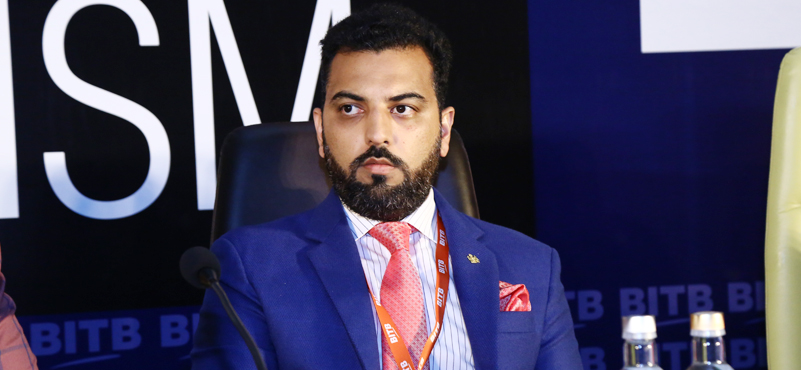In the nascent sphere of alternative accommodation in the country, Chennai-headquartered Stayzilla has gradually evolved as a possible major flag bearer of the segment in the future. In a recent exclusive conversation with TourismFirst on the sidelines of PhocusWright conference, Yogendra Vasupal, CEO, Stayzilla strongly emphasised that promoting homestays in India entails bringing in the quintessential localised approach. The online platform is aiming at a phenomenal growth in its inventory base in the next two years.

CEO, STAYZILLA
In the travel marketplace, Yogendra Vasupal, the CEO and Founder of Stayzilla is believed to be yet another representative of that young, tech driven breed which is keen to write its own rules. Even as Stayzilla has a larger portfolio comprising products across various categories, its focus on homestays has broadly caught the attention of the market observers calling it the real differentiator which the company is offering to travellers. Many market observers even call Stayzilla as the blind aping of global alternative accommodation major Airbnb model. You mention it to Yogendra Vasupal but it does not vex him a bit. Instead, the soft spoken head of Stayzilla presented his own logic.
“It is not right to say that we are taking Airbnb approach though like them we are trying to get homestays in the country on the online stream. But every market has its own peculiarities and in India the supply side (possible hosts of the homestays) just don’t open up quite readily,” Vasupal emphasised. The company which presently has around 8000 homestay units in its portfolio unlocking nearly 25,000 rooms in the market across the country for alternative accommodation claims to be adding up scale on the basis of its localised strategy as different from a plain, vanilla approach. “If you want more units to open up, you need to offer the hosts some control over the kind of guests they would prefer to have in their units. This is a critical point and our solution is built around this prime consideration,” added Vasupal.
The details provided by Stayzilla CEO further amplified their operational module which has a strong constituent of the localised approach. To begin with, Stayzila is ready to welcome anyone on its member list across the country if he has some spare rooms which can be used to host the visitors. But its critical offering is allowing the hosts to choose the kind of guests they would be comfortable with. “The beauty of our model is that you can choose your guests. On our platform, you can tell us what type of guests you are willing to host – it could be families, business travellers, etc. There are other criterion too – you can say I want guests who are only vegetarians or those who speak in some specific languages. You can even specify the profession of guests you would like to host in your units. Once we know the preference of hosts, we send them the matching enquiries,” explained Vasupal.
That is the key strategy on the supply side. An equally important issue is the selection of units which can afford to deliver reasonable quality to their guests. And according to Vasupal, Stayzilla has a definitive set of parameters which are used to judge a property before they are placed on its online stream. “For selecting a property, we have our own liveability index. The physical verification by our team is a must and the primary consideration of this exercise is to judge whether the unit can host a family. Our team analyses that and if we don’t feel comfortable, we don’t accept the property. On the overall basis, we have 50 points check list on the basis of which we classify properties,” he added.
The five -year-old ‘stays’ marketplace also caters other products like hotels, lodges and guest houses but according to Vasupal, developing homestays as the core of its business has been the basic premise since day one. And the results in the recent months have convinced the promoter that its idea of converting homes into hotel units have begun finding buyers in large numbers. “Today, we are adding around 150 units every week in our inventory. In the last six months, our growth has been rapid. Prior to that, alternative accommodation used to account for 6 percent of our business and now it is close to 30-40 percent. You will be surprised to know that in a place like Kargil, we have ten units. We are inching close to accomplish our basic objective – to make homestays the core of our business,” he elaborated.
A major theory doing the rounds in the marketplace, however, is that despite its claim of being a pan-Indian operator present in over 4000 towns, its stronghold is South Indian states. Vasupal, on his part, strongly refuted this assumption. “We have spread across India as our ambition since day one has been to emerge as a pan-Indian operator. There is no stronghold regional pocket for us. Yes, we do have a sizeable number of units in Kerala but this is primarily because the state is quite open to homestays concept, But we have opened up across the country – whether its north-east, west or north. We are also focusing on the prominent tourism destinations in places like Rajasthan where you will find many Stayzilla homestays options in cities like Jaipur, Udaipur, etc,” he responded.
Meanwhile, having seen a rapid growth in the past six months, the online stays marketplace is now convinced that a decisive momentum has begun in favour of its homestays offerings and is looking for a significant expansion in its portfolio. “We are looking at opening 200,000 hosts in the next two years. That would bring in 300,000-400,000 rooms in the market. There are many units, where hosts offer two rooms on an average and that shoots up the actual room inventory. It is quite achievable,” said Vasupal.
Early this year, the marketplace was abuzz with the rumours that Stayzilla is facing hurdles in raising a fresh round of funding to pursue its future growth plans. The company has received sizeable funding in the past from investing firms like Matrix Partners, Nexus Venture Partners and Indian Angel Network. Vasupal, however, whisked aside the proposition of any financial worries in the near run. “We have raised another round of funding and we have enough money which will take care of our next 18 months of operations. The latest round has come from a VC,” he informed though he did not disclose the precise ticket size of the latest round a funding.




































